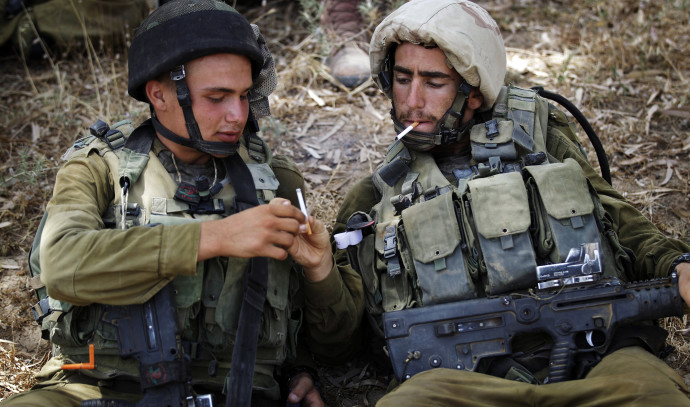Supermarkets are collecting donations to buy cigarettes for reserve soldiers about to go into battle in Gaza. On Tuesday morning, the Carrefour supermarket in Jerusalem’s Ramat Beit Hakerem announced on its public address system that it was collecting money for cigarettes for soldiers and hung a sign calling for NIS 10 donations “for our brave soldiers,” but the oral announcement mentioned only cigarettes.
When this reporter went to the person in charge and said it was illegal to give free cigarettes, she said: “Whole companies of soldiers asked for tobacco, so we shouldn’t give it to them?” I pointed out that 360,000 Israeli reservists are waiting at the border to go the Gaza, and have quite a lot of free time while waiting – and that many would become addicted to smoking. Asked who gave such an order, she called someone in Carrefour, but then refused to answer.
When this reporter called Carrefour management for a comment, they promised to respond today, but they didn’t. When I returned to the supermarket later, the public-address system asked for donations for “drinks and food for soldiers,” but when I asked a senior employee of the store and asked if they would also send soldiers cigarettes (and recorded her), she said: “We will also send cigarettes. They asked for it. Soldiers want cigarettes. Do you want to tell them not to smoke?”
An illegal offer
Health Ministry officials have not yet issued a statement discouraging the illegal practice, however the stipulated punishment for providing free cigarettes by an individual is over NIS 200,000 and for an institution or company is over NIS 450,000.
Lawyer Amos Hausner, who is chairman of the Israel Council for Prevention of Smoking, recalled that about a decade ago, when Israeli soldiers were fighting terrorists, that the Israel Cancer Association said giving cigarettes to soldiers was harmful not just in the long term by making them addicted but because researched showed the chances for recovery from wounds in soldiers who smoked were reduced. Hausner suggested that soldiers who were smokers could be given nicotine replacement like chewing gum or skin patches that would not cause such harm.
The American Journal of Public Health published a long study in 2009 entitled “Everywhere the Soldier Will Be: Wartime Tobacco Promotion in the US Military” describing the history of tobacco company promotion of tobacco to soldiers, “that places them at increased risk for not only war hazards but also tobacco addiction and disease. Tobacco use diminishes troop health and readiness and increases medical and training costs.”
The University of California researchers wrote that “military tobacco-control efforts began in 1986, yet tobacco use remains high. To determine whether and how the tobacco industry targets military personnel in wartime, we analyzed internal industry documents about the Gulf War (1990–1991) and constructed a historical case study. During this conflict, tobacco companies targeted troops with free cigarettes, direct advertising, branded items, ways to communicate with family, and ‘welcome home’ events. Military authorities sometimes restricted this activity, but frequently enabled it; tobacco companies were regarded as benefactors.
Considering tobacco use a benefit undermines military health priorities. Stronger policy is needed to reframe tobacco use as incompatible with military ideals.”
Military health concerns
The Veterans Health Administration estimated that veterans also have significantly higher rates of smoking than do civilians. “American troops were deployed to Saudi Arabia in August 1990. By September, campaigns were underway to send troops “care packages” of food, personal care products (like lip balm), and cigarettes,” the researchers wrote.
“A retired army colonel requested donations of cigarettes from tobacco companies Lorillard, Philip Morris, Brown & Williamson, and RJ Reynolds. Philip Morris sent 10,000 cartons of Marlboros via the 82nd Airborne Division from Pope Air Force Base in North Carolina. The cigarettes were distributed by the United Services Organization to members of the US Army, Air Force, and Marines. This study illustrates some of the dynamics that have prevented the military from meeting its goals for reducing tobacco use.” Incremental changes in military tobacco policy have been made,
They concluded that military tobacco control policies “should characterize tobacco use as unmilitary, making tobacco control important to all personnel, regardless of their primary functions. These policies should include prohibiting sales through military outlets, making bases 100% smoke-free, and, with adequate cessation support for current users, requiring personnel to abstain from tobacco. Without such policies, there are unlikely to be widespread changes in military tobacco culture and use, personnel will continue to be vulnerable to tobacco industry marketing efforts, and more veterans will return from war addicted to tobacco.”
During the Yom Kippur War, Nina Katzir – wife of the fourth president Prof. Ephraim Katzir – send loads of Playboy magazines to soldiers “because it they begged for them.” It caused an uproar, but seeing naked women on its pages is surely less harmful to their health than giving them free tobacco.



